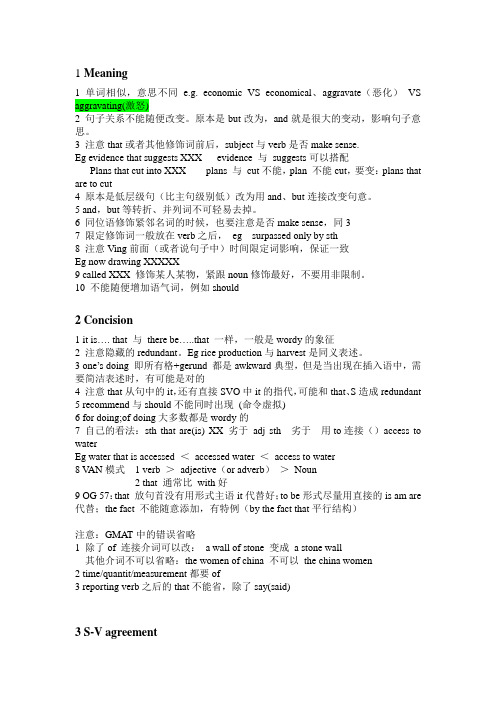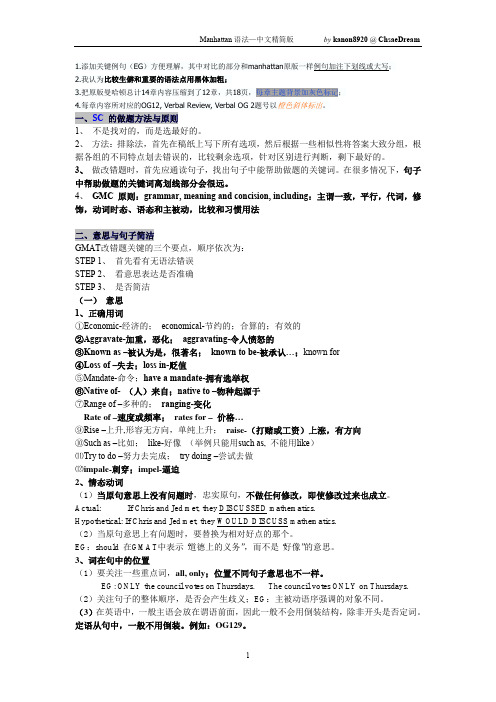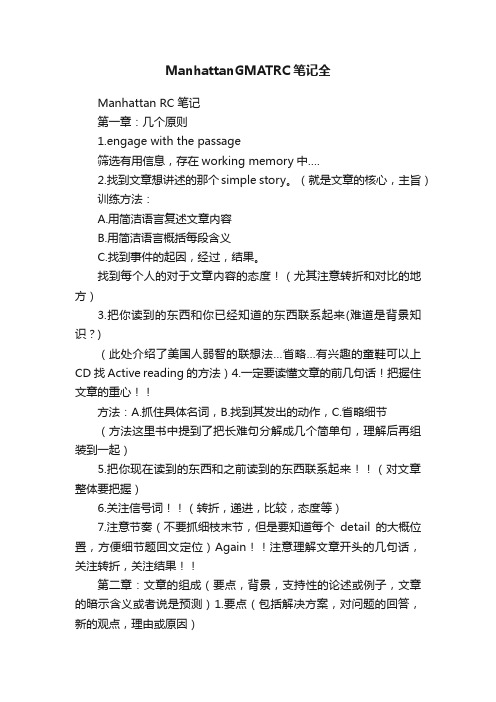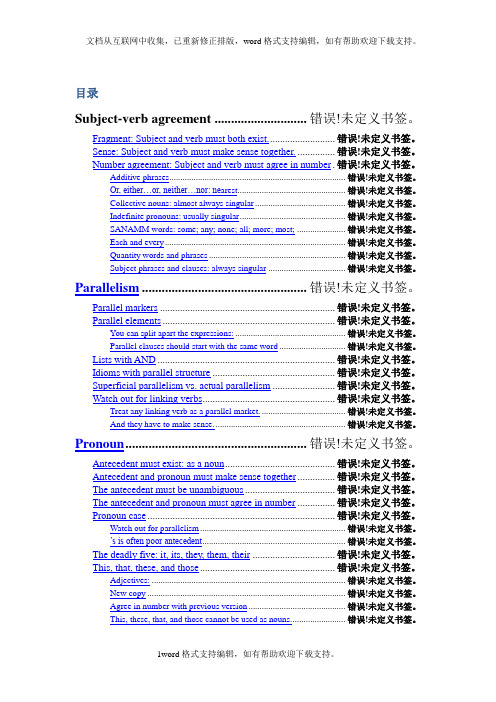Manhattan总结(中文)——GMAT语法
GMAT曼哈顿语法中文版之欧阳化创编

My Manhattan(5th)Notes——Daisyotw CH1 SC Basics1.控制在60s~75s2.做题步骤:理解原句,垂直阅读选项,split排除错误,放回原文检查CH2 Grammar&Meaning一.语法:主谓一致,平行,代词,修饰语,动词时态、语态和主被动,比较和习语二.语义:1.词的选择:(1)注意一词多义Economic-经济的;economical-节约的;合算的;有效的Aggravate-加重,恶化; aggravating-令人愤怒的Known as –被认为是,很著名;known to be-被承认…;known forLoss of –失去;loss in-贬值Mandate-命令;have a mandate-拥有选举权Native of- (人)来自;native to –物种起源于Range of –多种的; ranging-变化Rate of –速度或频率; rates for –价格…Rise-上升,无方向,单纯上升;raise-(打赌或工资)上涨,有方向Such as –比如;like-好像(举例只能用such as, 不能用like)Try to do –努力去完成; try doing –尝试去做Impale-刺穿;impel-逼迫(2)情态动词(may,will,must,should)不要随意添加或改变(*should 表“应该”,不表示likelihood;法律法规只能用must不能用should)(3)选项和原文态度一致2.词的位置:关注重点词(all,only)和句子整体顺序3.词的搭配:主谓一致,逻辑一致,make sense三.避免冗余:1.在一个句子中,不要用两个意思一样的词Rise-increase;sum-total;regain-again;enable-be able to;attempt-try;other than-opposite;drop-decrease;sufficient-enough;including-among;have to–require及近义词then-later; so-in order to2.注意being、having,虽然二者大多数情况是错的,但GMAT也通常会制造一些其他的语法错误,使得此类选项稍好一点。
manhattan OG横向总结

1 Meaning1单词相似,意思不同 e.g. economic VS economical、aggravate(恶化)VS aggravating(激怒)2 句子关系不能随便改变。
原本是but改为,and就是很大的变动,影响句子意思。
3 注意that或者其他修饰词前后,subject与verb是否make sense.Eg evidence that suggests XXX evidence 与suggests可以搭配Plans that cut into XXX plans 与cut不能,plan 不能cut,要变:plans that are to cut4 原本是低层级句(比主句级别低)改为用and、but连接改变句意。
5 and,but等转折、并列词不可轻易去掉。
6 同位语修饰紧邻名词的时候,也要注意是否make sense,同37 限定修饰词一般放在verb之后,eg surpassed only by sth8 注意Ving前面(或者说句子中)时间限定词影响,保证一致Eg now drawing XXXXX9 called XXX 修饰某人某物,紧跟noun修饰最好,不要用非限制。
10 不能随便增加语气词,例如should2 Concision1 it is…. that 与there be…..that 一样,一般是wordy的象征2 注意隐藏的redundant。
Eg rice production与harvest是同义表述。
3 one’s doing 即所有格+gerund 都是awkward典型,但是当出现在插入语中,需要简洁表述时,有可能是对的4 注意that从句中的it,还有直接SVO中it的指代,可能和that、S造成redundant5 recommend与should不能同时出现(命令虚拟)6 for doing;of doing大多数都是wordy的7 自己的看法:sth that are(is) XX 劣于adj sth 劣于用to连接()access to waterEg water that is accessed <accessed water <access to water8 V AN模式 1 verb >adjective(or adverb)>Noun2 that 通常比with好9 OG 57:that 放句首没有用形式主语it代替好;to be形式尽量用直接的is am are 代替;the fact 不能随意添加,有特例(by the fact that平行结构)注意:GMAT中的错误省略1 除了of 连接介词可以改:a wall of stone 变成a stone wall其他介词不可以省略:the women of china 不可以the china women2 time/quantit/measurement都要of3 reporting verb之后的that不能省,除了say(said)3 S-V agreement单数主语+verbs 复数主语+verb1 and与additive phrase 例如:as well as, along with.And使主语成为混合主语+ 复数;而as well as 不改变主语Eg Joe,as well as Tim, is still bla bla bla.2 either or;neither nor都存在时,单复数由距离verb最近的词决定只有either或neither出现,一定用singular.3 集合名词基本全用singular4 SANAM some any none all more/most 由后面单词决定Eg some of the money was……..Some of the documents were………..5 each、every在subject之前用单数,subject之后看情况eg They each are bla bla bla …..6 数量词:the number of/a number ofOf引导介短由名词决定eg half of the pie is ; half of the slices are…Majority/minority Eg the majority of XX are …The majority has ……4 parallelism1 一些词例如:was ving/can lose/ to increase 要求在平行结构中自动省略这些词2 大多数句子平行要求相同引导词,也有特例,待补充。
GMAT SC Manhatten曼哈顿语法总结(770NN)

GMAT SC Manhatten曼哈顿语法总结(770NN)目录Subject-verb agreement (7)Fragment: Subject and verb must both exist (7)Sense: Subject and verb must make sense together (8)Number agreement: Subject and verb must agree in number (9)Additive phrases (9)Or, either…or, neither…nor: nearest . 9Collective nouns: almost alwayssingular (9)Indefinite pronouns: usually singular.9SANAMM words: some; any; none; all;more; most; (9)Each and every (9)Quantity words and phrases (9)Subject phrases and clauses: alwayssingular (10)Parallelism (10)Parallel markers (10)Parallel elements (11)You can split apart the expressions:.. 12Parallel clauses should start with thesame word (12)Lists with AND (13)Idioms with parallel structure (13)Superficial parallelism vs. actual parallelism (13)Watch out for linking verbs (14)Treat any linking verb as a parallelmarket. (14)And they have to make sense (15)Pronoun (15)Antecedent must exist: as a noun (15)Antecedent and pronoun must make sense together (15)The antecedent must be unambiguous (16)The antecedent and pronoun must agree in number (16)Pronoun case (16)Watch out for parallelism (16)’s is often poor antecedent (17)The deadly five: it, its, they, them, their (17)This, that, these, and those (18)Adjectives: (18)New copy (18)Agree in number with previous version (18)This, these, that, and those cannot beused as nouns. (18)Modifiers (19)Adjectives and adverbs (19)Adjective + adjective + noun (19)Adverb + adjective + noun (19)Noun modifiers (20)Misplaced modifier (21)Dangling modifier (21)Modifiers have to make sense (22)Noun modifiers with relative clause.. 22Essential vs. non-essential nounmodifiers (23)Verb modifiers (23)Verb tense, mood and voice (25)Tense (25)Simple tense (25)Progressive tense (25)Keep verb tense consistent (25)Present perfect: still in effect (26)Past perfect: the earlier action (26)Tense sequence (27)The subjunctive mood (28)Hypothetical subjunctive (28)If...then constructions (28)The command subjunctive (29)Active voice vs. passive voice (31)Comparisons (32)Keeping comparisons parallel (32)Comparisons must be logically parallel (32)Comparisons must be structurallyparallel (33)Omitted words (33)Comparative and superlative forms (34)Idioms (35)Odds and ends (55)Connecting words (55)Connecting punctuation (57)Comma (57)Semicolon (58)Colon (59)Dash (59)Quantity (60)Advanced strategy: GMC/S-V/PARALLELISM (61)Concision: specific patterns of wordiness (61)Pattern 1: prefer a verb to an actionnoun (61)Pattern 2: prefer a That-clause (withverbs) to a series of phrases (withnouns) (63)Pattern 3: prefer a verb to an adjective. (63)Pattern 4: prefer an adjective to anoun (64)Pattern 5: prefer an adverb to aprepositional phrase (65)Pattern 6: prefer an adjective to anadjective clause with be (65)Pattern 7: r emove IT IS...THAT (66)Concision: don’t make it too short (66)Pattern1: keep the prepositionalphrase if you need to (66)Pattern2: keep THAT OFor THESEOF if you need to (68)Pattern 3: keep THAT after areporting verb (68)Parallelism: concrete nouns and action nouns (69)Infinitives (71)Adjectives and participles: (71)Advanced strategy: pronouns and modifiers (72)Other pronouns (72)There (72)Itself, themselves: (73)DO SO versus DO IT (73)Placeholder IT (73)1. Postpone infinitive subjects (73)2. Postpone That-clause subjects (74)3. Postpone infinitive or That-clauseobjects (74)Nuances of pronoun reference: (74)Modifiers: Exceptions to the Touch Role (75)1. Mission Critical modifier (75)2. A very short predicate falls between,shifting a very long modifier back (75)3. A short non-essential phraseintervenes and is set off by comas. (76)4. The modifier is part of a seriesparallel modifiers, one of whichtouches the noun. (76)Possessive Nuances (76)Subgroup modifiers (77)More on relative clauses vs. participles (77)Absolute phrases (78)Advanced strategy: Verbs & comparisons (80)Helping verbs: BE, DO and HA VE (80)Infinitives (82)Gerunds (83)Participles (84)When to use which word (85)More on LIKE and AS (86)Numbers in comparisons (88)Other comparison constructions (89)Subject-verb agreementFragment: Subject and verb must both exist.Missing of working verb: The electron named in 1894.Connecting word and no main clause: Because the dog was never mine/ Which will be approvedtomorrow.Sense: Subject and verb must make sense together.Wrong: The proliferation of computer games designed to involve many players at once were first developed before the widespread availability of high-speed internet connections. Right: Computer games designed to involve many players at once have proliferated; such games were first developed before the wide spread availability of high-speed internet connections.Number agreement: Subject and verb must agree in numberAdditive phrasesOr, either…or, neither…nor: nearestCollective nouns: almost always singularIndefinite pronouns: usually singularSANAMM words: some; any; none; all; more; most;Some of the money was stolen from my wallet; Some of the papers were stolen from the bank. 另外如同majority minority plurality 等词也是要看情况的Each and everyEvery dog and cat has paws.Each of these shirts is pretty.They each are great tennis players.Quantity words and phrasesA number ofThe number ofSubject phrases and clauses: always singularHaving good friends is a wonderful thing. Whatever they want to do is fine with me.ParallelismParall el markersMarkers StructuresAnd X and YX, Y and ZBoth/and Both X and YOr X or YEither/or Either X or YNot/but Not X but YNot only/but also Not only X but also YRather than X rather thanYFrom/to From X to YParall el el ementsElements ExamplesNouns Her expressionreflected both angerand relief.Adjectives The park was neitheraccessible noraffordable.We collected bothsecond and third-gradebooks.Verbs The custodian cleanedthe basement andwashed the windows. Infinitives We would like not onlyto hear your side of thestory but also toprovide a response. Participles The actor left quickly,shunning fans andPrepositional It was important toleave the money in thedrawer rather than onthe table. Subordinate clauses They contended thatthe committee wasbiased and that itshould be disbanded. You can split apart the expressions:The division was opening offices, hiring staff and investing in equipment.The railroad can either lose more money or solve its problems.They wanted to increase awareness, spark interest, and motivate purchases.Parallel clauses should start with the same wordWrong: I want to retire to a place where I can relax and that has low taxes.Right: I want to retire to a place where I can relax and where the taxes are low.Wrong: Ralph likes both those who are popular and who are not.Right: Ralph likes both those who are popular and those who are not.Lists with ANDBe careful as you tally items:Wrong: She argues that the agency acts with disregard for human life and property and reckless abandon and it should therefore be shut down.Right : She argues that the agency acts with reckless abandon and with disregard for human life and property and that is should therefore be shut down.Idioms with parall el structureSuperficial parallelism vs. actual parall elismWrong: Sal applied himself in his new job,arrived early every day, skipped lunch regularly, and left late every night.Right: Sal applied himself in his new job, arriving early every day, skipping lunch regularly, and leaving late every night.Watch out for linking verbsTo BE Other linking verbsAre Become SmellWas Feel SoundWere Grow StayAm Look TasteBeen Remain TurnBe RepresentBeing ResembleTreat any linking verb as a parallel market.Wrong: The bouquet of flowers was a giving of love.Right: The bouquet of flowers was a gift of love.And they have to make sense.Wrong: Upon being nominated, this politician represents a step forward in urban-rural relations in this country.Right: The nomination of this politician represents a step forward in urban-rural relations in this country.PronounsAnteced ent must exist: as a nounWrong: The park rangers discussed measures to prevent sever wildfires, which would be devastating to it.Right: The park rangers discussed measures to prevent sever wildfires, which would be devastating to the park.Anteced ent and pronoun must make sense together Wrong: Although the term “supercomputer”may sound fanciful or exaggerated, it is simply an extremely fast mainframe that can execute trillions of calculations every second.Right: Although the term “supercomputer” may sound fanciful or exaggerated, it simply refers to an extremely fast mainframe that can execute trillions of calculations every second.The anteced ent must be unambiguousWrong: Researchers claim to have developed new “nano-papers”incorporating tiny cellulose fibers, which they allege give them the strength of cast iron.Right: researchers claim to have developed new “nano-papers”incorporating tiny cellulose fibers, which allegedly give these materials the strength of cast iron.The anteced ent and pronoun must agree in number Pronoun caseWatch out for parallelismSupernovas destroy their immediateenvironments in vast explosions, but by synthesizing heavy chemical elements, they provide the universe with the possibility of biochemistry-based life as we know it.’s is often poor antecedentWrong: The board is investigating several executives’compensation packages in order to determine how much may have been improperly awarded to them.Here THEM refers to “packages”, so it is wrong. Right: The board is investigating the compensation packages of several executives in order to determine how much these executives may have been awarded.The d eadly five: it, its, they, them, theirWrong: Whenever a student comes, take down their information.Right: Whenever a student comes, take down his or her information.Right: Whenever students come, take downtheir information.This, that, these, and thoseAdjectives:New “nano-papers” incorporate fibers that give these materials strength.New copyThe money spent by her parents is less than that spent by her children.The money spent by her parents is more than it was expected to by.Agree in number with previous versionWrong: Her company is outperforming those of her competitors.Right: Her company is outperforming the companies of her competitors.This, these, that, and those cannot be used as nouns.Wrong: Her products are unusual; manyconsider these unique.Right: Her products are unusual; many consider them unique.ModifiersAdjectives and adverbsAdjective + adjective + nounBoth adjectives modify the noun.Wrong: James Joyce is Max’s supposedly Irish ancestor.Right: James Joyce is Max’s supposed Irish ancestor.Adverb + adjective + nounThe adverb modifies the adjective.Wrong: Max’s grandmother is his supposed Irish ancestor.Right: Max’s grandmother is his supposedly Irish ancestor.Noun modifiersType Position ExampleAdjective BeforenounAfternoun The lazy cat took a nap. The cat, lazy from overeating, took a napPropositi on BeforenounAfternounOn the couch, the cattook a nap.The cat on the couchtook a nap.Past participle BeforenounAfternounThe tired cat took anap.Tires from chasingmice, the cat took a nap.Present participle without commas BeforenounAfternounThe sleeping cat took anap.The cat sleeping on thecouch is named “Sue”.Relative pronoun AfternounThe grey cat, whichloves tuna, took a nap.The cat that lives nextAnother noun BeforenounAfternounA lover of mice, my cathunts night and day.The cat, a tabby raisedon a farm, took a nap.Misplaced modifierWrong: Jim biked along an old dirt road to get to his house, which cut through the woods. Right: To get to his house, Jim biked along an old dirt road, which cut through the woods.Dangling modifierWrong: Resigned to the bad news, there was no commotion in the office.Wrong: There was no commotion in the office, resigned to the bad news.Right: Resigned to the bad news, the officeworkers make no commotion.Also true for verb modifiers:Wrong: Using the latest technology, the problem was indentified.Right: Using the latest technology, the engineer indentified the problem.Modifiers have to make sense.Wrong: Only in the past century has origami’s development, a ceremonial activity invented millennia ago, into a true art form taken place. Right: Origami-a ceremonial activity invented millennia ago- has developed into a true art form only in the past century.Noun modifiers with relative clauseThat or whom can be dropped when acting as the objectiveThe security guard we met was nice.The movie we watched last Friday was scary.“Where” cannot be used to modify a metaphorical placeSuch as condition, situation, case, circumstance, or arrangementWrong: We had an arrangement where he cooked and I cleaned.Right: We had an arrangement in which he cooked and I cleaned.Essential vs. non-essential noun modifiersVerb modifiersType PositionExampleAdverb BeforeverbAfterverb Frequently, I walk to the store.I frequently walk to the store.I walk frequently to the store.Preposition Beforeverb On Mondays, I walk to the storeAfter verbI walk to the store on Mondays.SubordinatorBefore verb After verbWhenmycarisbroken, I walk to the store.I walk to the store when mycarisbroken.Some modifiers can modify both the subject and the verb. Type Positio nExample Present participle with comasBefore verbAfter verbWhistling “Beat it ”, Ilifted the weight. I lifted the weight, whistling“Beat it ”. Preposition + simple gerund Before verbAfter verbBy concentration, Ilifted the weight. I lifted the weight by concentration.Verb tense, mood and voiceTenseSimple tenseSimple present tense is often used to express “eternal” states or frequent events.Use simple present to define general definitions.Use simple present with state verbs such as KNOW and SIGNIFYProgressive tenseKeep verb tense consistentIf you want to switch tense, make it clear: Right: He is thinner now because he spent thelast six months on a strict diet.Present perfect: still in effectPresent perfect indicated either continued action or continued effect of a completed action. Right: The child drew a square in the sand, but the ocean erased it.Right: The child drew a square in the sand, but the ocean has erased it.Awkward: The child has drawn a square in the sand, but the ocean has erased it.If you want to talk about a specific, completed time period, use the simple past:Wrong: Veronica has traveled all over the world in 2007.Right: Veronica travelled all over the world in 2007.Past perfect: the earlier actionYou should use past perfect only to clarify or emphasize a sequence of past events.If the sequence is already obvious, we do not need to use past perfect.Right: Antonio drove to the store and bought some ice cream.When you see BEFORE Or AFTER, don’t use the past perfect.Right: Laura locked the deadbolt before she left for work.Tense sequenceScientist: The supercollider is ready, it did not cost too much, and it will provide new insights into the working of the universe.Report: The scientist announced that the supercollider was ready, that it had not cost too much, and that it would provide new insights into the workings of the universe.Avoid mixing present tense with conditionaltense:Right: The scientist believes that the machine will be wonderful.Right: The scientist believed that the machine would be wonderful.Wrong: The scientist believes that the machine would be wonderful.Wrong: The scientist believed that the machine will be wonderful.The subjunctive moodHypothetical subjunctiveIf…then constructionsType Form ExampleGeneral rule with no uncertainty If present,then presentIf Sophie eatspizza, then shebecomes ill.General rule with some uncertainty If present,then CAN orMAYIf Sophie eatspizza, then shemay become ill.Particular case (in the future) with no uncertainty If present,then futureIf Sophie eatspizza tomorrow,then she willbecome ill.Unlikely case (in the future) Ifhypotheticalsubjunctive,thenconditionalIf Sophie atepizza tomorrow,then she wouldbecome ill.Case that never happened (in the past) If pastperfect, thenconditionalperfectIf Sophie hadeaten pizzayesterday, thenshe would havebecome ill.The command subjunctiveBossy verb + that + subject + command subjunctiveWrong: We propose the school board disband. Wrong: We propose that the school boardshould disband. Type WordExample Verbs that take only the command subjunctiveDemand,dictate, insist, propose, recommend, request, stipulate, suggestWe demand thathebehere.Verbs that take only infinitiveAdvise, allow, forbid, persuade, wantWe allow him to be here.Verbs that take either formAsk,beg, intend, order, prefer, urge, require Werequire thathebehere.We require him to be here.Nouns that take the command subjunctiveDemand, requestHisdemandthat he be paid full severance was not met.take the command subjunctive crucial,desirable,fitting,imperative,important,mandatory,preferable,urgent, vitalthat Gary beready beforesoon.Avoid the use of the command subjunctive after WHETHER.Wrong: I like ice cream, whether it be chocolate, vanilla, or any other flavor.Right: I like ice cream, whether it is chocolate, vanilla, or any other flavor.Active voice vs. passive voiceDo not use verbs besides BE to form the passive voice.Wrong: the pizza must got eaten today.ComparisonsComparison signalsLike AsUnlike As (adj.) asMore than As much asLess than As little asFaster than As fast asDifferent from The same asIn contrast to/withKeeping comparisons parall elComparisons must be logically parallelWrong: Frank’s build, like his brother, is broad and muscular.Right: Frank’s build, like his brother’s, is broad and muscular.Right: Frank’s build, like that of his brother, is broad and muscular.Right: Frank, like his brother, has a broad and muscular build.Comparisons must be structurally parallelWrong: I like to run through forests more than I enjoy walking through crowds.Right: I like running through forests more than walking through crowds.Omitted wordsPut in the omitted words or appropriate helping verbs only if you need to remove ambiguity. Right: Vishal eats more carrots than donuts. Wordy: Vishal eats more carrots than he dose donuts.Ambiguous: I like cheese more than Yvette. Right: I like cheese more than I do Yvette. Right: I like cheese more than Yvette does.Ambiguous: Tomas is more interested in video games than his girlfriend.Right: Tomas is more interested in video games than his girlfriend is.Right: Tomas is more interested in video games than in his girlfriend.GMAT occasionally allows unnecessary Helping verbs.Right: Apples are more healthy to eat than caramels.Right: Apples are more healthy to eat than caramels are.Comparative and superlative formsDo not compare an adverb that ends in –ly by changing the ending to –er.Wrong: Adrian runs quickly. He runs quicker than Jacob.Right: Adrian runs quickly. He runs more quickly than Jacob.However, some adverbs that do not end in –ly are made into comparatives by adding –er. Right: Adrian runs fast. He runs faster thanJacob.Do not use a comparative adjective unless you have a THAN in the sentence.Wrong: With winter coming, I will have higher energy bills.Wrong: I will have higher bills over last year. Right: I will have higher bills than last year.IdiomsImportant idiom listActThe bay acted as a funnel for the ride. (function as)My friend acted like a fool. (behave)AgreeThey agree that electrons exist.Electrons are particles that physicists agree exist.AidShe aids her neighbor.She provides aid to victims.Aid for victims is available.Her aid in walking the dog is appreciated.AimWe adopted new procedures aimed at reducing theft.We adopted new procedures with the aim of reducing theft.Aim to do 错误!AnxietyHis anxiety about his company’s future is ill-founded.His anxiety that his company may be sold is ill-founded.AppearImperfections appear as tiny cracks (show up as)He appears confused (seems)The dinosaurs appear to have been relatively smart.It appears that the dinosaurs were smart.AsAs I walked, I became more nervous.(during) As I had already paid, I was unconcerned. (because, since)As we did last year, we will win this year. ( in the same way)As the president of the company, she worked hard.(in the role of )As a child, I delivered newspapers. (in the stage of)My first job was an apprenticeship as a sketch artist.As part of the arrangement, he received severance.As…as…Cheese is not as great as people say.We have three times as many pears as you.His knowledge springs not so much from experience as from schooling.AskI asked for her aid.He asked her to go to the store.He asked that she go to the store.AwareAware of the danger, he fled.Aware that danger was near, he fled.With an aware that/of….错误!BanThey passed a ban prohibiting us from carrying bottles.They passed a ban that…错误!BeginThe movement began as a protest. (was born as) The movement began with a protest. (protest was the first part)The protest began a movement. (caused)BelieveShe believes that Gary is right.She believes Gary to be right.It is believed that Gary is right.Gary is believed to be right.BordersWithin the borders of a countryIn/inside the borders….错误!ButI study hard but take breaks.I study hard, but I take breaks.ChanceI have one chance in a thousand of winningtonight.ClaimThey claim that they can read minds.They claim to be able to read minds.Compared/comparisonIn comparison to/with horses, zebras are vicious.A zebra can be compared to a horse in many ways.Compared with a horse, a zebra is very hard to tame.ConfidenceWe have confidence that the market will recover.ConceiveHe conceives of architecture as a dialog. Conceive of sth. to be…. 错误!ConsiderI consider her a friend.I consider her intelligent.I consider illegal the law passed last week by the new regime.The law is considered illegal.ContendThey contend that they can decipher the code.ContinueThe danger will continue to grow.The danger will continue its growth.错误!CostPollution cost us billions in increased medical bills.CreateYou will create a team to lead the discussion.CreditHugo credits sally with good taste.Sally is credited with good taste.DangerWe are in danger of forgetting the past.DateThey dated the artifact at three centuries old. Dated to be 错误!DeclareI declared the election a fraud/ invalid.I declared invalid the referendum that the new regime imposed.DependThe outcome depends on whether he can make friends.DesignThe window is designed to open.DevelopThe executive developed her idea into a project. The idea developed into a project.DifferenceThere is a difference in ability between us. There is a difference between what you can do and what I can do.There are differences in what you and I can do.DisinclinedShe is disinclined to write to her parents.Distinguish/distinctionThe investor distinguished between trends and fads.There is a distinction between trends and fads.DoubtWe do not doubt that the apples are ripe.We have no doubt that the apples are ripe.She doubts whether Jan will arrive on time.ElectShe elected to withdraw her money early.EnoughThe book was short enough (for me) to read in a night.EnsureHe ensures that deadlines are metEquippedThey are equipped to fight on any terrain.EvenI am even richer than a king.I earn as much money as even the wealthiest king.ExpectWe expect the price to fall.The price is expected to fall.We expect that the price will fall.It is expected that the price will fall.There is an expectation that the price will fall.ExpendWe expend energy on neighborhood development.ExtentWe enjoyed the film to some extent. “Thumbs part up”is the extent to which we enjoyed the film.FaultThe criminals are at the fault for breaking the law.ForbidThe law forbids any citizen to vote twice.GoalThe goal is to expand the company.He helps (to) rake the leaves.He helps me (to) rake the leaves.His help in raking the leaves has been welcome.HoldThe law holds that jaywalking is illegal.InsteadWe avoided the arcade and instead went to a movie.IntentI went with the intent to leave soon.I went with the intent/intention of leaving soon.KnowWe know her to be brilliant.She is known to be brilliant.We know him as Reggie.He is known as Reggie.Old gadgets are lacking in features.Old gadgets lack features.The lack of features is upsetting.LessLess than 10%Lower than 10% 错误!LikelyMy friend is likely to eat worm.It is likely that my friend will eat worm.My friend is more likely than my enemy to eat worms.My friend is twice as likely as my enemy to eat worms.More than likely, my friend will eat worms.LossI have suffered a loss of strength. (decline in quality)They have suffered a loss in the euro. (decline ininvestment)MandateThe general mandated that a trench be dug.MassThe truck has ten times the mass of a small car. The truck is ten times the mass of a small car. 错误!MeansMusic education is a means to improved cognition.A means of/for. 错误!NativeThe kangaroo is native to Australia.My friend is a native of Australia.Not…butShe did not eat mangoes but ate other kinds of fruit.A tomato is not a vegetable but a fruit.NumberThe number of dogs has fallen.Dogs have fallen in number.错误!OweHe owes money to government for back taxes.PrivilegeThe academy gave senior cadets dancing privileges.Worse: the academy gave senior cadets the privilege of dancing.PronounceShe pronounced the book a triumph.ProposeThey attorneys proposed that a settlement be reached.The attorneys proposed to meet for lunch.。
Manhattan 语法—中文精简版 Ver.2

三、主语与谓语 每一个句子都必须有一个主语和谓语(动词),且主语和谓语要一致。 (一)连词开头的句子一定要有主句,否则是错误的。 EG: Because the dog was never mine. 错误,缺乏一个主句 (二)主语和谓语从逻辑上一定要合理,主语和谓语在单复数上要一致 EG: × The development of a hydrogen car based on expected performance parameters will be able to travel hundreds of miles without refueling. (development能够不加油就跑几百miles) (三)容易引起主语不明显的两个情况 1. 插入语:在主语和谓语之间插入一些说明的成分 2.前置短语:在主语之前放一些修饰成分 EG: (when the auditors left), the executive (who had been interviewed) was glad. 说明:从句始终只是句子中辅助的成分,类似大形容词,大名词或大副词 (四)and 和 表示连接的词 1. and 连接几个不同的名词的时候构成复数结构,谓语动词要用复数。 2. 其他连接性的词(along with, in addition to, as well as, together with, including)连接不 同的名词,只是起着修饰的作用,不会改变主语的单复数,不影响谓语动词。 3. 一些表示学科的词 (physics, mathematics) 、 一些活动 (aerobics) 和一些疾病 (diabetes) 虽然以S结尾,仍属于单数名词,谓语动词用单数。
ManhattanGMATRC笔记全

ManhattanGMATRC笔记全Manhattan RC 笔记第一章:几个原则1.engage with the passage筛选有用信息,存在working memory中….2.找到文章想讲述的那个simple story。
(就是文章的核心,主旨)训练方法:A.用简洁语言复述文章内容B.用简洁语言概括每段含义C.找到事件的起因,经过,结果。
找到每个人的对于文章内容的态度!(尤其注意转折和对比的地方)3.把你读到的东西和你已经知道的东西联系起来(难道是背景知识?)(此处介绍了美国人弱智的联想法…省略…有兴趣的童鞋可以上CD找Active reading的方法)4.一定要读懂文章的前几句话!把握住文章的重心!!方法:A.抓住具体名词,B.找到其发出的动作,C.省略细节(方法这里书中提到了把长难句分解成几个简单句,理解后再组装到一起)5.把你现在读到的东西和之前读到的东西联系起来!!(对文章整体要把握)6.关注信号词!!(转折,递进,比较,态度等)7.注意节奏(不要抓细枝末节,但是要知道每个detail的大概位置,方便细节题回文定位)Again!!注意理解文章开头的几句话,关注转折,关注结果!!第二章:文章的组成(要点,背景,支持性的论述或例子,文章的暗示含义或者说是预测)1.要点(包括解决方案,对问题的回答,新的观点,理由或原因)主语要点和文章主题的关系!2.背景(为了了解文章所需知道的信息)3.support(支持文章所用的例子或者观点)4.implication(要点导致的结果)5.书中在这里提到一个预示文中提到problem-------------预示着要点是resolution文中提到question-------------预示着要点是answer文中提到老观点-------------- 预示着要点是新观点文中提到observation------- 预示着要点是reason或new idea 注意:预示不是一定出现的,不要过于依赖。
GMAT语法笔记

GMAT语法笔记个人GMAT语法笔记,综合ManhattanSC及prep语法笔记主谓一致一.原则1.主谓必须同时存在连词开头的句子一定要有主句,否则是错误的becae,if,when,although从句开头的句子,若从句后面没有逗号,一定错。
2.主语和谓语从逻辑上一定要合理,且主语和谓语在单复数上要一致。
当不清楚主语是否应该是单数/复数的时候,看宾语,想造成这个宾语的主语是什么样的★若不知道主语是否单复,就想是什么造成公司的上涨。
肯定是一件事。
所以是单数3.找到真正的主语---去掉介宾短语,从句及动词短语修饰词介宾短语(of,/forby,/in,/with/,at,/to,/on,/from后面的词不是主语可以忽略,所以要学会看到介词跳读。
)从句始终只是句子中辅助的成分,类似大形容词,大名词或大副词4.不能确定的话,一般用单数谓语动词规律1.and连接几个不同的(单数)名词的时候构成复数结构,谓语动词要用复数2.就前原则的短语morethan;nolethan;beide;e某cept;3.就近原则:or,nor,either…or;neither…nor;not...but..(notthat…butratherthat…);notonly…butalo;(注意,只有either,neither做主语时,谓语动词用单数)5.模糊代词,谓语动词用单数:(-one,-thing)Anyone,anybody,anything,Noone,nobody,nothing,notoneEach,every(apronoun)Someone,omebody,omethingEveryone,everybody,everything,whatever,whoeverEither,neither(mayrequireapluralverbifpairedwithor/nor)6.以下代词的单复数由后面的名词决定:Someof,Anyof,None,Allof,More/Motof,nohalfof,majority,minority,pluralityof,theretof,分数/百分数Ifyouwanttoindicatethetotalityitelf,thenueaingularverbform.e.g.ThemajorityofthetudentinthiclaAREhardworker.个人GMAT语法笔记,综合ManhattanSC及prep语法笔记7.each/every做主语,单数:由each/every开头+任何名词(不论单复数)单数谓语EverydogandcatHASpaw.复数名词(代词)+each+复数谓语TheyeachAREgreattenniplayer9.agroupof/abodyof/anarrayof/aerieof/aetof/aportionof+复数名词,谓语动词用单数!10.atotalof,anaverageof+复数名词,复数vtheaverageof+复数名词,单数v10.一些表示学科的词(phyic,mathematic)、一些活动-有氧运动(aerobic)和一些疾病-糖尿病(diabete)虽然以S结尾,仍属于单数名词,谓语动词用单数当tatitic做“统计数据”,economic做“经济政策”时,复数v;new谓语动词用单数pecie物种(单数)4.集合名词看做整体,谓语动词用单数:如果说一种动物比如cat(无冠词)。
GMATSCManhatten曼哈顿语法总结(770NN)

目录Subject-verb agreement ............................ 错误!未定义书签。
Fragment: Subject and verb must both exist........................... 错误!未定义书签。
Sense: Subject and verb must make sense together. ............... 错误!未定义书签。
Number agreement: Subject and verb must agree in number . 错误!未定义书签。
Additive phrases................................................................................ 错误!未定义书签。
Or, either…or, neither…nor: ne arest................................................. 错误!未定义书签。
Collective nouns: almost always singular ......................................... 错误!未定义书签。
Indefinite pronouns: usually singular................................................ 错误!未定义书签。
SANAMM words: some; any; none; all; more; most; ...................... 错误!未定义书签。
Each and every.................................................................................. 错误!未定义书签。
GMAT曼哈顿语法中文版.doc

My Manhattan(5th) Notes——DaisyotwCH1 SC Basics1.控制在60s~75s2.做题步骤:理解原句,垂直阅读选项,split 排除错误,放回原文检查CH2 Grammar&Meaning一.语法:主谓一致,平行,代词,修饰语,动词时态、语和主被动,比较和习语二.语义:1.词的选择:(1) 注意一词多义Economic-经济的;economical-节约的;合算的;有效的Aggravate- 加重,恶化;aggravating- 令人愤怒的Known as –被认为是,很著名;known to be- 被承认⋯;known forLoss of –失去;loss in-贬值Mandate- 命令;have a mandate-拥有选举权Native of- (人)来自;native to –物种起源于Range of –多种的;ranging-变化Rate of –速度或频率;rates for –价格⋯Rise-上升,无方向,单纯上升;raise- (打赌或工资)上涨,有方向Such as –比如;like- 好像(举例只能用such as, 不能用like )Try to do –努力去完成;try doing –尝试去做Impale- 刺穿;impel- 逼迫(2) 情态动词(may,will,must,should) 不要随意添加或改变(*should 表“应该”,不表示likelihood; 法律法规只能用must 不能用should)(3)选项和原文态度一致2.词的位置:关注重点词(all,only) 和句子整体顺序3.词的搭配:主谓一致,逻辑一致,make sense三.避免冗余:1. 在一个句子中,不要用两个意思一样的词Rise-increase;sum-total;regain-again;enable-be able to;attempt-try;other than-opposite;drop-decrease;sufficient-enough;including-among;have to –require及近义词then-later; so-in order to2.注意being 、having ,虽然二者大多数情况是错的,但GMAT 也通常会制造一些其他的语法错误,使得此类选项稍好一点。
- 1、下载文档前请自行甄别文档内容的完整性,平台不提供额外的编辑、内容补充、找答案等附加服务。
- 2、"仅部分预览"的文档,不可在线预览部分如存在完整性等问题,可反馈申请退款(可完整预览的文档不适用该条件!)。
- 3、如文档侵犯您的权益,请联系客服反馈,我们会尽快为您处理(人工客服工作时间:9:00-18:30)。
Chapter 1 SC Basics (1)Chapter 2 GRAMMAR, MEANING, CONCISION (1)Chapter 3 SUBJECT-VERB AGREEMENT (3)Chapter 4 PARALLELISM (5)Chapter 5 PRONOUNS (6)Chapter 6 MODIFIERS (8)Chapter 7 Verb tense , mood, & voice strategy (11)Chapter 8 comparison strategy (13)Chapter 9 Idioms——看原书Chapter 10 Odds & ends (15)Chapter 11 GMC/S-V /PARALLELISM: ADVANCED (18)Chapter 12 pronouns & modifiers: advanced (19)Chapter 13 verbs & comparisons:advanced (22)Chapter 1 SC Basics1、各个选项中最好的答案并不一定是完全正确、完美的2、日常口语中实际上有很多语法错误3、SC的做题方法:将每个选项逐个代入句子读一遍再寻找错误是很费时间的,更好的方法应该是使用分类排除的方法(split)。
将五个选项按照某个语法点的区别分成两组或更多,找到你所确认的错误排除其中的一些组;再次分组,再次排除,直到剩下最终答案。
4、在一道题中将会测试多个语法点,平常练习中需要找出所有的点,而在考试时只需要找到一个能排除该选项的即可;而且每个选项往往都有多个点可以将其排除。
5、注意划线外部分,注意划线部分与划线外部分的关系,有许多重要的线索在远离划线部分的地方。
选择一个选项后要重读一遍句子,确认选项使得句子完整。
Chapter 2 GRAMMAR, MEANING, CONCISION1、在做SC时,判断选项是否错误应该从语法开始,然后考虑意思,最后考虑简洁。
语法:GMAT测试你区分好和不好的语法的能力。
许多语法错误的句子看起来很自然。
意思:句子不能有歧义,并且句子必须反映作者的真实的意愿,在选择选项时不要随便改变句子的原意(除非原句错误)。
简洁:不使用多余的词。
2、GRAMMAR:包括主谓一致、平行、代词、修饰语、时态、语气语态、比较、惯用语。
3、MEANING:不要随便改变句子原意。
GMAT考试中,意思上的小错误常常容易被忽略。
在MEANING上的主要考点主要可以归类为:选择正确的词、词的正确位置和词与词之间的一致。
(1)选择正确的词:常考的是相近的词相互替代而使句子意思发生改变。
如:词/词组意思词/词组意思aggr avate worsenaggravatingirritatingkno w as namedknown tobeacknowledged asloss ofno longer inpossession ofloss in decline in valueman date commandhave amandatehave authority fromvotersnati ve of person from native tospecies thatoriginated inrange ofvariety of ranging varyingrate ofspeed or frequencyofrates for prices forrise general increase raisea bet of a salary increasesuchasfor instance like similar totryto doseek to accomplish try doing experiment with按照助动词如may, will , must, should所表示的意思程度进行选择。
例如,should有一种“道德上的义务”的意味而不是“有可能”,不能在这样的句子里使用:The court ruled that the plaintiff should pay full damages。
助动词的选择要注意作者的原意是什么,如果没有错误就不要改动。
(2)词的正确位置:位置的改变可能带来句意的变化,比如all和only的修饰和其所在的位置有很大关系。
因此如果一个词的位置改变了,就要考虑是否改变句子意思,特别注意一些短的量词或者表示限制意思的词。
除了关注单个词的位置之外,还要考虑整个句子的词语顺序(比如一般而言主动比被动更符合语言习惯),找出不必要的插入语等。
(3)词与词之间的一致:不仅有语法上的一致(比如主谓一致、代词与被指代词单复数一致),还有逻辑意思上的一致性。
总的来说,就是一组有关联的词必须使句子有意义。
4、CONCISION:这是放在GRAMMAR和MEANING之后,进行最后考虑的因素。
一般来说,如果一个短语和一个词都能表示一项意思,GMAT倾向于用一个词,从而减少wordy。
常见错误还有,句子中存在多个表示同样意思的词或词组(如sum和total同时存在),表示时间的词组也容易出现重复的错误(表示过去的有:previously, formerly, in the past, before now等;表示现在的有:now, currently, presently, at present等;表示每年的有:annual, each year, …a year等。
表示同一个意思的词语不应该同时出现在句子中)。
Being常常意味着重复冗余的错误,应该尽量避免,但GMAT现在也出现了有Being的选项是正确的情况,因此不能轻率排除。
OG中与MEANING和CONCISION相关的题目:OG12:8,12,16,17,21,31,37,39,49,57OG VERBAL(2nd):3,18,22,36,54,72Chapter 3 SUBJECT-VERB AGREEMENT1、主谓一致不仅包括主谓单复数一致,还包括逻辑意思上的有效性、一致性(也就是说主语必须是谓语的合理发起者)。
2、一个完整的句子要求主语和谓语都存在,GMAT常出的错误选项有两种使句子不完整的手段:(1)没有实际有意义的动词(比如句中有一个看起来像谓语的分词: The electron named in 1894. electron 显然不是name的发出者,因此named是一个分词,句子缺少了实际的动词);(2)句子以连词开头,导致句子成为一个从句,而从句是不能脱离主句单独存在的(比如Because the dog was never mine.)。
3、主谓语的搭配必须使得句子有意义,也就是主语必须是谓语的合理发起者。
4、主谓单复数一致问题:(1)跳过中间的插入内容。
一般插入的内容有介词短语从句分词等形式的其他修饰成分三大类。
跟在名词后的介词短语常常修饰名词。
如of mice, for milk, by 1800, in Zambia等等,可以将其省略去找主语。
从句常常修饰句子的其他成分,有时候使作为一个大的形容词、副词甚至名词存在的,它们不包含主谓语,可以将其省略去找主语。
现在分词v-ing及过去分词v-ed, v-en,以及被逗号单独隔开的部分往往都是修饰成分。
(2)使用句子结构来确定主谓语。
总的来说,就是一个介词短语中的名词不能成为主语,因此常常省略of+n结构来判断主语(of+n有例外的两种情况,见下文)。
遇到句中包含从句时,要注意使主句和从句的主谓分别匹配、一致。
句子的意思始终指导你把主谓联系到一起并且考虑是不是逻辑上合理,而最终决定哪个选项正确还应该通过考虑句子的结构。
(3)And和additive phrases,只有and改变主语的单复数。
and能够连接多个单数的主语,形成一个复合的复数主语(比如Joe AND his friends ARE going to the beach.)因此要求复数的谓语与之对应。
additive phrases能够向主语添加一些东西,但是并不形成复合的主语,这些additive phrases的作用和修饰成分一样,不改变主语单复数。
比如:Joe, as well as his friends, IS going to the beach.常见的additive phrases有:along with/ in addition to/ as well as/ accompanied by/ together with/ including等。
学科名词(如mathematics)、一些活动(如aerobics)以及疾病名词(如diabetes)虽然以s结尾,但是是单数名词。
(4)or/ either…or…/ neither…nor…如果一个主语包含了以上三种结构,甚至有可能两个名词一个单数一个复数,谓语的单复数与最接近的名词一致(就近一致)。
如:Neither the coach nor the players ARE going to the beach.但是如果either或者neither单独出现在句子中(不是以either…or/ neither…or)的形式出现,那么谓语是单数形式。
(5)集体名词如:agency/army/audience/class/committee/crowd/orchestra/team/baggage/citrus/ equipment/fleet/fruit/furniture等,在GMAT考试中几乎都认为是单数的主语。
(6)非特指的代词,常常是单数形式的主语,除了some/any/none/all/more/most。
非特指代词有:anyone/anybody/anything/each/every/either/neither/someone/somebody/something/whatever/whoever/noone/nobody/nothing/everyone/everybody/everything等。
例外是:some/any/none/all/more/most, 后面既可以是单数形式也可以是复数形式的谓语。
这几个词的单复数判断要取决于句子的意思。
这种情况下要关注介宾短语of+n结构中的名词(省略of+n结构来判断主语的例外之一),这个名词决定了句子意思和谓语应当是单数还是复数。
如:Some of the money WAS stolen.Some of the documents WERE stolen.None of+复数名词,后面既可以跟单数或者复数形式的谓语;而not one of+名词则只能使用单数形式的谓语。
